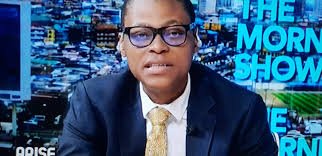For some time now, Rufai Oseni, a fiery anchor on Arise TV’s popular The Morning Show, has been ruffling feathers across Nigeria’s airwaves. His “victims” include the high and mighty in Nigerian politics — a species more accustomed to neatly starched togas and deferential interviews. Many walk into the Arise studio with springs in their steps and leave huffing, puffing, and humiliated.
One of them reportedly swore never to return to Arise TV until Rufai was either sacked or silenced. Such is the man’s notoriety that a new street proverb has emerged: “The fear of Rufai is the beginning of wisdom.”
Rufai’s questions are rarely just questions. They come laced with data, opinion, and pointed follow-ups that feel less like interviews and more like interrogations. He’s also a master of the ill-timed interjection. The moment a guest begins to find footing, Rufai throws a curveball to trip him up — deliberately, even “maliciously,” it seems.
Sometimes, even as a viewer, you find yourself squirming and asking: “Why can’t Rufai just keep his questions simple and short?”
But simplicity is not Rufai’s style. His approach rattles his guests, leaving them feeling ambushed — as if before an inquisition, not a conversation. Fight or flight instincts take over. Rarely does it end well.
That was precisely the case when Works Minister Dave Umahi recently visited the Arise TV studio. Asked about the cost per kilometer of the controversial Lagos-Calabar Coastal Highway, the minister tried to dance around the figures. Rufai held his ground. The interview quickly descended into an insult match.
Umahi has since joined the growing list of powerful officials baying for Rufai’s head. It’s almost a miracle that it still sits on his shoulders. For far less, others before him have been sacrificed — like chickens before a shrine.
There’s only one logical reason Rufai still has his job: he draws eyeballs — and revenue. As long as that remains true, Arise TV’s investors will keep him in his seat. And so, Rufai Oseni prowls the nation’s airwaves like a lion on the hunt, while politicians and their handlers graze nervously on the savanna, praying not to be his next prey.
The Rufai Question
On the sidelines of this drama lies a larger question: Is Rufai Oseni a proper journalist or a crusader in disguise? Are his methods professional, or is he a hatchet man masquerading as a member of the Fourth Estate? Is he holding the powerful accountable — or simply setting them up for public roasting?
And then, perhaps the most telling question of all: Why is there no one else like him?
As a professional journalist myself — one who started out long before Rufai — I admit I’m not his biggest fan. Many of his tactics would have been frowned upon in the newsrooms and lecture rooms of old. He could achieve his purpose with fewer words and less theater. Personally, I prefer the restrained styles of Charles Aniagolu or Seun Okinbaloye.
Yet I’ve also learned that journalism’s rulebooks were written by people — and people can be wrong or blindsided. And sometimes, the only place for those rulebooks is the shredding machine.
Nigeria is no ordinary country. Our politics, our politicians, even our public morality rarely conform with “global best practices.” Nor do some of our highest national institutions play by the rules. So why must our journalism always pretend to?
Courage Over Credentials
Critics often remind us that Rufai studied Animal Science, not Journalism. It’s a fair point for purists who believe in formal training. But I suspect most of the outrage comes from bruised egos and vested interests — the power brokers angered by his audacity to ask the questions others won’t.
And truly, what have many of Nigeria’s so-called “proper” journalists done for the greater good? How well have they played their role as watchdogs? How often do they hold those in power accountable?
I was drawn into journalism in the mid-1980s by men like Dele Giwa, Ray Ekpu, Dan Agbese, and Yakubu Mohammed — the Newswatch quartet. They wrote with courage and clarity, turned every stone in pursuit of truth, and gave journalism its dignity. I joined the newsroom in 1988, brimming with idealism, and left four years later, disillusioned by what I saw: professionals groveling before power, trading their conscience for crumbs, looking away in the face of impunity.
In that sense, Rufai Oseni stands apart. He may be brash, even abrasive. He may not check all the boxes of textbook journalism. But what he lacks in polish, he makes up in courage and conviction. For that he deserves respect.
Perhaps his background in Animal Science explains why he so easily breaks out of journalism’s old cages. Whatever the reason, he has brought back something our industry sorely lost: fearlessness.
Those who don’t like it have two choices — shut up or shape up.
Victor Anazonwu is a writer, public affairs analyst and author based in Lagos.
![]()



